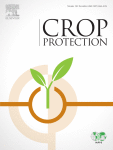Ver ítem
- xmlui.general.dspace_homeCentros Regionales y EEAsCentro Regional CorrientesEEA Bella VistaArtículos científicosxmlui.ArtifactBrowser.ItemViewer.trail
- Inicio
- Centros Regionales y EEAs
- Centro Regional Corrientes
- EEA Bella Vista
- Artículos científicos
- Ver ítem
Oomycetes associated with strawberry diseases in Corrientes, Argentina
Resumen
Oomycetes species are widely distributed and represent a significant threat to horticulture, forestry and agriculture. Several factors, such as initial health condition of the plants, date of transplant, environmental conditions and crop management practices contribute to the incidence of these pathogens, leading to important economic losses. Despite the importance of the diseases caused by Oomycetes in vegetable crops in Corrientes (Argentina), there is
[ver mas...]
Oomycetes species are widely distributed and represent a significant threat to horticulture, forestry and agriculture. Several factors, such as initial health condition of the plants, date of transplant, environmental conditions and crop management practices contribute to the incidence of these pathogens, leading to important economic losses. Despite the importance of the diseases caused by Oomycetes in vegetable crops in Corrientes (Argentina), there is a serious lack of information about host-pathogen interaction, which makes it difficult to establish efficient control strategies. The objective of this work was to characterize and identify pathogenic oomycetes of strawberry crown and roots in Corrientes. A total of 7 isolates were obtained after field sampling. Morphological and molecular characterization was carried out as well as pathogenicity tests. Five different species of oomycetes were identified: Pythium irregulare, Pythium spinosum, Phytophthora cactorum, Phytopythium vexans and Phytopythium mercuriale. To our knowledge, this is the first record of Pythium irregulare, Phytopythium mercuriale and P. vexans in strawberry in Argentina.
[Cerrar]

Autor
Ibanez, Julia Magali;
Favaro, María Alejandra;
Obregon, Veronica Gabriela;
Lattar, Tatiana Elisabet;
Fuente
Crop Protection 157 : 105967 (July 2022)
Fecha
2022-07-01
Editorial
Elsevier
ISSN
0261-2194
Formato
pdf
Tipo de documento
artículo
Palabras Claves
Derechos de acceso
Restringido
 Excepto donde se diga explicitamente, este item se publica bajo la siguiente descripción: Creative Commons Attribution-NonCommercial-ShareAlike 2.5 Unported (CC BY-NC-SA 2.5)
Excepto donde se diga explicitamente, este item se publica bajo la siguiente descripción: Creative Commons Attribution-NonCommercial-ShareAlike 2.5 Unported (CC BY-NC-SA 2.5)

